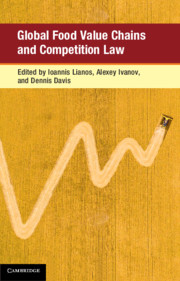Book contents
- Global Food Value Chains and Competition Law
- Global Competition Law and Economics Policy
- Global Food Value Chains and Competition Law
- Copyright page
- Contents
- List of Authors
- 1 Global Food Value Chains
- 2 Rents, Power and Governance in Global Value Chains
- 3 The Financialization of Land and Agriculture
- 4 Agriculture, End to End
- 5 New Forms of Financing the Agricultural Sector in Brazil
- 6 Economic Concentration and the Food Value Chain
- 7 The State of American Competition Law with Respect to the Food Chain
- 8 The Brazilian Food Value Chain and Competition Policy
- 9 Competition Concerns in Fertilizer Import-Dependent Countries like India and China
- 10 Russian Competition Policy Over Value Chains in Agricultural and Food Sectors
- 11 The Pioneer/Pannar Merger, the Maize Seed Value Chain and Globalisation
- 12 Power in the Food Value Chain
- 13 Efficiency and Fairness
- 14 China’s Legal Regulation of the Abuse of Market Power by Large Retailers
- 15 Superior Bargaining Power in Russian Contract and Competition Law
- 16 Regulating Unfair Trading Practices in the EU Food Supply Chain
- 17 Food Chain Certification and the Social Pluralism of Competition Law
- 18 Hunger Games
- 19 Agribiotech Patents in the Food Supply Chain
- 20 Mergers and Product Innovation
- 21 The Global Grain Trade
- Index
13 - Efficiency and Fairness
Interdependent Discourses in Supermarket-Supplier Relations
Published online by Cambridge University Press: 12 May 2022
- Global Food Value Chains and Competition Law
- Global Competition Law and Economics Policy
- Global Food Value Chains and Competition Law
- Copyright page
- Contents
- List of Authors
- 1 Global Food Value Chains
- 2 Rents, Power and Governance in Global Value Chains
- 3 The Financialization of Land and Agriculture
- 4 Agriculture, End to End
- 5 New Forms of Financing the Agricultural Sector in Brazil
- 6 Economic Concentration and the Food Value Chain
- 7 The State of American Competition Law with Respect to the Food Chain
- 8 The Brazilian Food Value Chain and Competition Policy
- 9 Competition Concerns in Fertilizer Import-Dependent Countries like India and China
- 10 Russian Competition Policy Over Value Chains in Agricultural and Food Sectors
- 11 The Pioneer/Pannar Merger, the Maize Seed Value Chain and Globalisation
- 12 Power in the Food Value Chain
- 13 Efficiency and Fairness
- 14 China’s Legal Regulation of the Abuse of Market Power by Large Retailers
- 15 Superior Bargaining Power in Russian Contract and Competition Law
- 16 Regulating Unfair Trading Practices in the EU Food Supply Chain
- 17 Food Chain Certification and the Social Pluralism of Competition Law
- 18 Hunger Games
- 19 Agribiotech Patents in the Food Supply Chain
- 20 Mergers and Product Innovation
- 21 The Global Grain Trade
- Index
Summary
Chapter 13 focuses more specifically on supermarket power and explore how efficiency and fairness become interdependent discourses in supermarket-supplier relations. Concentration in large grocery retail, in conjunction with associated growth in private labels and retailer control over shelf space, have generated a substantial power imbalance between big supermarket chains and the businesses that supply them. Supermarkets are said to be exploiting the imbalance to their own advantage, spawning a growing chorus of complaints from suppliers and from their representative organisations and political supporters. It has also garnered intense media, political and regulatory attention across a range of jurisdictions. This Chapter uses the analytical technique of problematisation to demonstrate how the “problem” concerning supermarket-supplier relations involves two distinct discourses relating to competition, on the one hand, and fairness, on the other. It highlights both potential tensions and interdependencies between these discourses and explores how they have been salient in both framing the aforementioned problem in public and policy debates and shaping regulatory responses. In particular, it critically examines the emergence of codes of conduct as a response to this problem drawing primarily on experience in Australia and to some extent, by way of comparison, the United Kingdom.
Keywords
- Type
- Chapter
- Information
- Global Food Value Chains and Competition Law , pp. 315 - 332Publisher: Cambridge University PressPrint publication year: 2022

